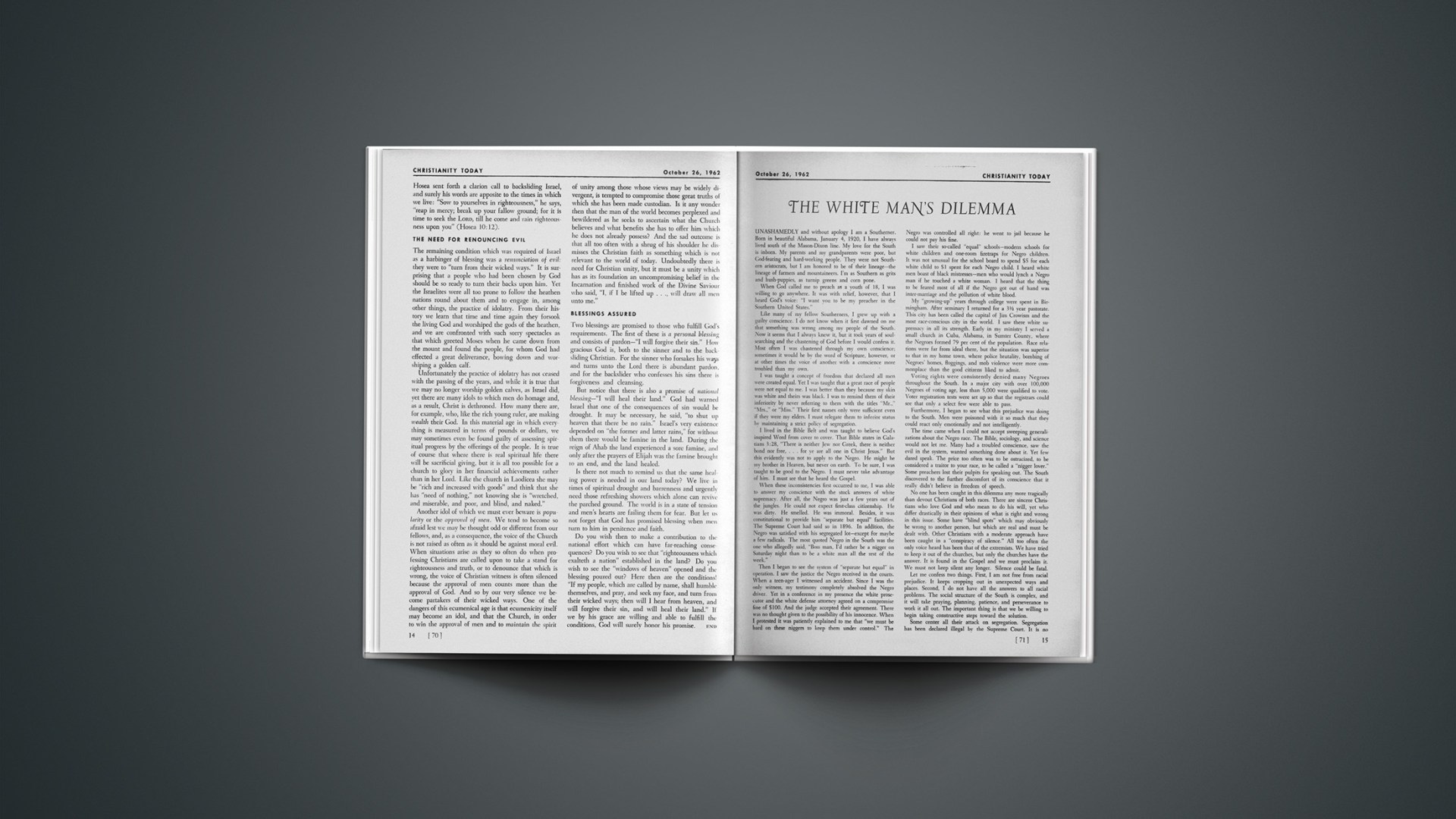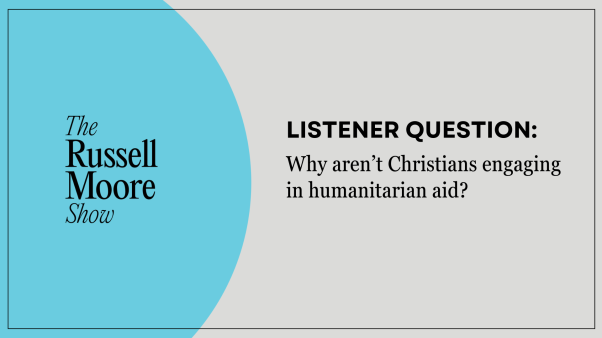Unashamedly and without apology I am a Southerner. Born in beautiful Alabama, January 4, 1920, I have always lived south of the Mason-Dixon line. My love for the South is inborn. My parents and my grandparents were poor, but God-fearing and hard-working people. They were not Southern aristocrats, but I am honored to be of their lineage—the lineage of farmers and mountaineers. I’m as Southern as grits and hush-puppies, as turnip greens and corn pone.
When God called me to preach as a youth of 18, I was willing to go anywhere. It was with relief, however, that I heard God’s voice: “I want you to be my preacher in the Southern United States.”
Like many of my fellow Southerners, I grew up with a guilty conscience. I do not know when it first dawned on me that something was wrong among my people of the South. Now it seems that I always knew it, but it took years of soul-searching and the chastening of God before I would confess it. Most often I was chastened through my own conscience; sometimes it would be by the word of Scripture, however, or at other times the voice of another with a conscience more troubled than my own.
I was taught a concept of freedom that declared all men were created equal. Yet I was taught that a great race of people were not equal to me. I was better than they because my skin was white and theirs was black. I was to remind them of their inferiority by never referring to them with the titles “Mr.,” “Mrs.,” or “Miss.” Their first names only were sufficient even if they were my elders. I must relegate them to inferior status by maintaining a strict policy of segregation.
I lived in the Bible Belt and was taught to believe God’s inspired Word from cover to cover. That Bible states in Galatians 3:28, “There is neither Jew nor Greek, there is neither bond nor free, … for ye are all one in Christ Jesus.” But this evidently was not to apply to the Negro. He might be my brother in Heaven, but never on earth. To be sure, I was taught to be good to the Negro. I must never take advantage of him. I must see that he heard the Gospel.
When these inconsistencies first occurred to me, I was able to answer my conscience with the stock answers of white supremacy. After all, the Negro was just a few years out of the jungles. He could not expect first-class citizenship. He was dirty. He smelled. He was immoral. Besides, it was constitutional to provide him “separate but equal” facilities. The Supreme Court had said so in 1896. In addition, the Negro was satisfied with his segregated lot—except for maybe a few radicals. The most quoted Negro in the South was the one who allegedly said, “Boss man, I’d rather be a nigger on Saturday night than to be a white man all the rest of the week.”
Then I began to see the system of “separate but equal” in operation. I saw the justice the Negro received in the courts. When a teen-ager I witnessed an accident. Since I was the only witness, my testimony completely absolved the Negro driver. Yet in a conference in my presence the white prosecutor and the white defense attorney agreed on a compromise fine of $100. And the judge accepted their agreement. There was no thought given to the possibility of his innocence. When I protested it was patiently explained to me that “we must be hard on these niggers to keep them under control.” The Negro was controlled all right: he went to jail because he could not pay his fine.
I saw their so-called “equal” schools—modern schools for white children and one-room firetraps for Negro children. It was not unusual for the school board to spend $5 for each white child to $1 spent for each Negro child. I heard white men boast of black mistresses—men who would lynch a Negro man if he touched a white woman. I heard that the thing to be feared most of all if the Negro got out of hand was inter-marriage and the pollution of white blood.
My “growing-up” years through college were spent in Birmingham. After seminary I returned for a 3½ year pastorate. This city has been called the capital of Jim Crowism and the most race-conscious city in the world. I saw there white supremacy in all its strength. Early in my ministry I served a small church in Cuba, Alabama, in Sumter County, where the Negroes formed 79 per cent of the population. Race relations were far from ideal there, but the situation was superior to that in my home town, where police brutality, bombing of Negroes’ homes, floggings, and mob violence were more commonplace than the good citizens liked to admit.
Voting rights were consistently denied many Negroes throughout the South. In a major city with over 100,000 Negroes of voting age, less than 5,000 were qualified to vote. Voter registration tests were set up so that the registrars could see that only a select few were able to pass.
Furthermore, I began to see what this prejudice was doing to the South. Men were poisoned with it so much that they could react only emotionally and not intelligently.
The time came when I could not accept sweeping generalizations about the Negro race. The Bible, sociology, and science would not let me. Many had a troubled conscience, saw the evil in the system, wanted something done about it. Yet few dared speak. The price too often was to be ostracized, to be considered a traitor to your race, to be called a “nigger lover.” Some preachers lost their pulpits for speaking out. The South discovered to the further discomfort of its conscience that it really didn’t believe in freedom of speech.
No one has been caught in this dilemma any more tragically than devout Christians of both races. There are sincere Christians who love God and who mean to do his will, yet who differ drastically in their opinions of what is right and wrong in this issue. Some have “blind spots” which may obviously be wrong to another person, but which are real and must be dealt with. Other Christians with a moderate approach have been caught in a “conspiracy of silence.” All too often the only voice heard has been that of the extremists. We have tried to keep it out of the churches, but only the churches have the answer. It is found in the Gospel and we must proclaim it. We must not keep silent any longer. Silence could be fatal.
Let me confess two things. First, I am not free from racial prejudice. It keeps cropping out in unexpected ways and places. Second, I do not have all the answers to all racial problems. The social structure of the South is complex, and it will take praying, planning, patience, and perseverance to work it all out. The important thing is that we be willing to begin taking constructive steps toward the solution.
Some center all their attack on segregation. Segregation has been declared illegal by the Supreme Court. It is no longer legal in public facilities. Segregation has absolutely no defense in the Bible. However, this is not really the main issue before us. Other areas of our nation have removed their segregation barriers and found that the problem remains. It is as if your house were on fire. The fire originated in the basement, but has now extended to the roof. It is not enough to put out the fire on the roof and leave the fire burning in the basement. Segregation is the fire on the roof. Racism is the fire in the basement. The house will be destroyed if all the fire is not put out, but the Christian may well focus his attention first on the source of the fire.
I do not know all the answers, but I am convinced that there is an answer, and that it can be found if Christian men, black and white, will search for it together.
As I first approached the Scriptures I had the feeling that I might find something to support the South’s position. After all, many sincere Bible-believing Christians are staunch segregationalists and believe firmly in white supremacy. Some base their beliefs on the “curse of Ham.” I studied Genesis 9. I found not the slightest reference to the Negro. The curse was pronounced not by God, but by Noah awakening out of a drunken stupor, and not on Ham but on his son, Canaan. Canaan was not turned black, nor did he father the Negro race. Rather he was the progenitor of the Canaanites, who were not black. All this was obvious to the reader of the Scripture, and one could come to only one conclusion. Using this Scripture to justify calling one race of people inferior was totally unwarranted. Identifying the Negro race with the curse of Ham was a cruel hoax conceived in prejudice and perpetuated in ignorance. The Bible, as a matter of fact, does not mention the Negro race. It asks, “Can the Ethiopian change his skin …?” (Jer. 13:23). In Acts 13:1 we have reference to “Simeon that was called Niger.” “Niger” means “black,” so we assume he was a Negro. If so, the church at Antioch was integrated, because he was either a prophet or a teacher there. Such references, however, give us no specific instructions. Such must be deduced from the great principles of the Bible.
The Bible teaches the common origin of man. God, the Creator, the Bible says, “made of one blood all nations of men for to dwell on all the face of the earth” (Acts 17:26). He placed Adam and Eve in the Garden of Eden, and from them all races have sprung. Man was created in God’s image. Therefore, every man possesses infinite worth and should be treated with respect as a person.
When man sinned and was separated from God, a Saviour was promised. Christ was the fulfillment. Those who experience his salvation become the children of God and brothers of each other. This spiritual relationship transcends race and all other considerations. Surely it would not be right for a Christian to show prejudice toward his brother. Rather he must love him. Jesus was most specific about that in 1 John 3:14: “We know that we have passed from death unto life, because we love the brethren. He that loveth not his brother abideth in death.” Again Jesus said, “Thou shalt love thy neighbor as thyself.” In view of the parable of the Good Samaritan that followed, surely no one today would seek to justify his white supremist attitude by asking, “And who is my neighbor?” (Luke 10:25–37).
The Bible further teaches that God is no respecter of persons.… Furthermore, the Bible teaches explicitly the equality of all men in Christ. Colossians 3:11 says, “Where there is neither Greek nor Jew, circumcision nor uncircumcision, Barbarian, Scythian, bond nor free: but Christ is all, and in all.” Beneath the withering heat of Bible truth what faith I had left in white supremacy faded away. I was faced with a choice: accept Southern tradition or the Word of God. What else could a Christian do?…
Nothing reached my heart more than the pleas of our missionaries around the world. I helped to send them out, and I felt a deep sense of responsibility to them. When they came home they told how stories of the Negroes’ treatment in America were spread around the world, especially among other black people. People on the mission fields asked the missionaries if it were really true that there was segregation in America and if stories of racial discrimination were factual. Many lost confidence in the sincerity of the American citizen who had sent a missionary to him. The eyes of the world were focused on our treatment of minority groups. Missionary after missionary warned us that our attitudes were making their work less effective.
It seemed to me that if my prejudice would keep even one soul on our mission field from finding the Saviour or add one ounce to the tremendous burdens already borne by our missionaries, it was a price too big to pay.
All over the world new independent nations are springing up. Many of these nations are predominantly of other races. In the past these people have looked to us with hope, for we were known as the champions of the oppressed. Now they are beginning to wonder if we really believe the ideals of freedom which we profess. The Communists have exploited the racial situation. J. Edgar Hoover says, “The controversy on integration has given the Communists a field day.”
Communism is our most potent enemy. The Red wave moves on. Communists have made vigorous attempts to win the American Negro. The vast majority of American Negroes have rejected them vigorously. Both J. Edgar Hoover and the House Committee on Un-American Activities testify to the failure of Communism to reach any large segment of American Negroes.
In facing the question of what to do, let us acknowledge that much has been done already. The picture is vastly different from that of 25 years ago. In spite of the problems that remain, the lot of the American Negro is better by far than that of his colored brethren elsewhere in the world. His standard of living is rising, he attends free public schools, is voting in larger numbers, has freedom of worship and many other privileges denied to his fellows in some nations.
There is much the Negro must do for himself. I would challenge those organizations working for Negro rights to remember that privilege demands equal responsibility. A demand for rights without acceptance of that responsibility can only result in chaos.
But let us recognize there is much we as white Christians can do. I have tried in this message to describe what has taken place in my own experience. This was no sudden change, nor did it take place recently. Much of what I have said has been said in part in other messages. I preach it now most of all to awaken your conscience, to commit you to the proposition that Christ has the answer to the racial problem, and that we as Christians must find it and proclaim it.
You must decide what you will do about it, but as a Christian I remind you that Jesus Christ has the right to control your attitudes and your conduct. Seek his guidance and do not be afraid to do as he commands. “And whatsoever ye do, do it heartily, as to the Lord, and not unto men; knowing that of the Lord ye shall receive the reward of the inheritance: for ye serve the Lord Christ” (Col. 3:23, 24).—A sermon by the Rev. JAMES L. MONROE, Pastor, Riverside Baptist Church, Miami, Florida.










